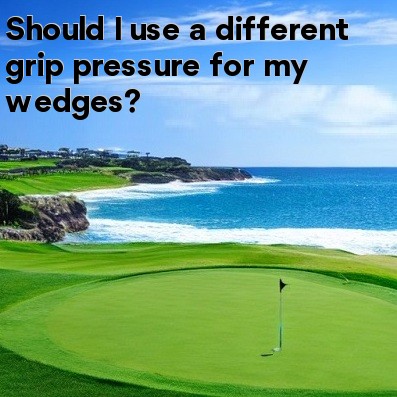
In golf, Should I use a different grip pressure for my wedges?
Grip pressure in golf plays a significant role in the performance and accuracy of a shot. It is often emphasized that finding the right grip pressure is crucial for consistent and effective swings. But should you use a different grip pressure for your wedges? Let's explore this topic further.
- The importance of grip pressure
Grip pressure refers to the force applied by your hands on the golf club. It directly affects the clubface angle, swing speed, and overall control of your shots. Gripping the club too tightly can restrict the natural movement of your wrists and lead to tension in your arms and shoulders. On the other hand, gripping the club too lightly can cause instability and loss of control.
Wedges and delicate shots
Wedges are primarily used for delicate shots around the greens, such as chips, pitches, and bunker shots. These shots require finesse, touch, and precision rather than power. Therefore, using a softer grip pressure is generally recommended when playing wedges.
- The benefits of a softer grip pressure
Using a softer grip pressure with your wedges can provide a few advantages:
- Enhanced feel and touch: A lighter grip allows you to sense the clubhead better and have a heightened feel, especially on short shots where control is crucial.
- Reduced tension: Tension in your hands and arms can negatively impact your swing and accuracy. Employing a lighter grip pressure helps alleviate tension, leading to smoother swings and better shot execution.
- Better clubhead control: By not squeezing the club tightly, you allow the clubhead to maintain its natural speed and release through impact, resulting in improved control over the ball.
Adjusting grip pressure according to the shot
While using a lighter grip pressure is generally recommended for wedge shots, it is important to understand that the appropriate grip pressure can vary depending on the specific shot you are trying to execute.
For example, when playing a longer pitch shot, you may need slightly more grip pressure to generate a bit more power and distance. On the contrary, for a short delicate chip, you might use an even softer grip pressure to minimize the risk of a mishit.
- Experiment and find your ideal grip pressure
Each golfer is unique, so finding the optimal grip pressure for your wedges may require some experimentation and practice. Spend time on the practice range, trying different grip pressures and paying attention to the results and how they feel.
Remember, a good grip pressure should provide a balance between control and freedom of movement. It should give you the confidence to execute your shots without tension or hesitation.
Conclusion
In golf, using a different grip pressure for your wedges can indeed be beneficial. Employing a softer grip pressure allows for enhanced feel, reduced tension, and better clubhead control on delicate shots around the greens. However, it is essential to adjust your grip pressure according to the nature of the shot you are playing, ensuring you find the right balance between control and power. Keep experimenting and practicing to discover your ideal grip pressure for wedge shots.





